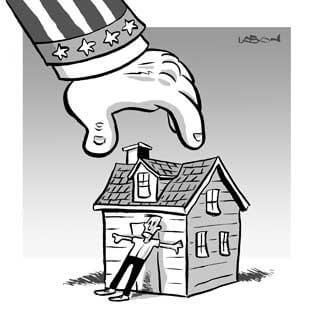Understanding the Consequences of Unpaid Property Taxes in New Jersey
 Unpaid property taxes in New Jersey can trigger a cascade of serious legal consequences for homeowners, potentially jeopardizing their property rights and financial stability. As experienced property tax lawyers near me frequently observe, municipalities have robust mechanisms to recover delinquent tax payments, including tax sales and liens.
Unpaid property taxes in New Jersey can trigger a cascade of serious legal consequences for homeowners, potentially jeopardizing their property rights and financial stability. As experienced property tax lawyers near me frequently observe, municipalities have robust mechanisms to recover delinquent tax payments, including tax sales and liens.
While property owners face strict quarterly payment obligations, those struggling with their tax burden may benefit from consulting a property tax appeal service to explore available relief options. Understanding these consequences and legal remedies is crucial for protecting your property interests and navigating potential challenges with municipal authorities.
Understanding New Jersey Property Tax Obligations
The management of property taxes in New Jersey requires careful attention, as unpaid property taxes can lead to severe consequences for property owners. Municipalities rely heavily on these tax revenues to fund essential services and infrastructure. While some properties may be subject to eminent domain taxation in specific circumstances, most property owners face standard quarterly payment obligations.
Payment Schedule and Grace Periods
Property tax payments are due quarterly on:
- February 1
- May 1
- August 1
- November 1
Most municipalities provide a ten-day grace period before penalties accrue. However, when taxes remain unpaid, interest charges begin retroactively from the first of the month. Property owners should note that rollback taxes may also apply in certain situations, particularly when land use changes affect tax status.
Legal Responsibilities of Property Owners
Under N.J.S.A. § 54:4-64, property owners bear the legal responsibility to determine their tax obligations, regardless of whether they receive a tax bill. This responsibility includes:
- Maintaining accurate records of payments
- Verifying tax amounts with local authorities
- Tracking payment deadlines
- Understanding municipal-specific policies
Note that while online resources are available, they may not reflect real-time updates. Therefore, direct communication with your local tax collector remains the most reliable method for obtaining accurate information about your tax obligations.
Accessing Tax Information
To determine current tax obligations, property owners can:
- Contact the local tax collector directly (recommended)
- Access municipal online payment portals
- Request written statements of account
- Review property tax records in person
Understanding Tax Sales and Certificate Auctions
When unpaid property taxes accumulate, New Jersey municipalities initiate tax sales to recover delinquent payments. As any experienced NJ tax lawyer can attest, these public auctions, mandated by state law, serve as a critical mechanism for townships to maintain their fiscal responsibilities while adhering to the real estate tax cap requirements.
Tax Sale Certificate Process
Municipalities auction Tax Sale Certificates to investors, using the proceeds to offset outstanding tax deficits. These certificates:
- Represent legal liens on the property
- Entitle holders to collect unpaid taxes plus interest
- Carry jurisdiction-specific interest rates
- May affect property ownership rights
Types of Tax Sales
New Jersey municipalities conduct two distinct types of tax sales:
- Standard Tax Sales
- Address previous year’s delinquent taxes
- Follow established statutory timelines
- Provide property owners with specific notice requirements
- Allow for redemption periods
- Accelerated Tax Sales
- Target current year’s tax delinquencies
- Implemented by select municipalities
- May expedite collection processes
- Subject to municipal discretion
Legal Implications and Timeframes
The tax sale process involves strict procedural requirements:
- Mandatory public notices
- Specified auction procedures
- Documented bidding processes
- Regulated redemption periods
Source: Julia Kagan, What Is a Tax Lien Certificate? How They’re Sold in Investing, Investopedia, June 7, 2024.
Tax Sale Foreclosure Proceedings
The accumulation of unpaid property taxes in New Jersey can trigger foreclosure proceedings, representing one of the most serious consequences for property owners. While property owners retain the right to file an NJ property tax assessment appeal during this period, understanding the foreclosure timeline and procedures is crucial for protecting property rights.
Tax Sale Certificate Holder Rights
Investors bid on Tax Sale Certificates for two primary reasons:
- Potential interest earnings on delinquent taxes
- Right to initiate foreclosure proceedings after statutory waiting periods
- Ability to acquire property title through legal process
Statutory Waiting Periods
- Third-Party Certificate Holders:
- Must wait two years before initiating foreclosure
- Property owners retain redemption rights during this period
- Full payment includes:
- Original tax amount
- Accrued interest
- Penalties
- Associated legal costs
- Municipal Certificate Holders:
- Six-month waiting period applies
- Municipality may begin foreclosure after this period
- Property owners maintain redemption rights until final judgment
Special Circumstances: Abandoned Properties
Under N.J.S.A. 55:19-81, properties meeting these criteria face expedited foreclosure:
- No legal occupancy for six months
- At least one delinquent tax installment
- Immediate post-tax sale foreclosure permitted
- Limited redemption period
 Preventing and Managing Tax Sales
Preventing and Managing Tax Sales
When faced with unpaid property taxes in New Jersey, property owners have legal options to prevent tax sales and protect their property rights. Understanding these options is crucial, and experienced property tax appeal lawyers can provide strategic guidance through this complex process.
Preventing a Scheduled Tax Sale
Under N.J. Stat. § 54:5-29, property owners can halt a scheduled tax sale by:
- Paying the full amount of delinquent taxes
- Covering all accrued interest
- Satisfying associated administrative costs
- Submitting payment before the scheduled sale date
Post-Sale Rights and Remedies
A completed tax sale does not immediately terminate property ownership rights:
- Property owners retain possession during the statutory period
- Full redemption rights remain active
- Payment plans may be available in some jurisdictions
- Legal challenges can be pursued when appropriate
Critical Timeline Considerations
Property owners should understand these key deadlines:
- Pre-sale notification period
- Grace period for payment
- Statutory redemption timeframe
- Legal challenge windows
Exercising the Right to Redeem
When dealing with unpaid property taxes in New Jersey, property owners maintain specific redemption rights under state law that provide crucial protections. Understanding the tax redemption process is essential for preserving property ownership rights and preventing permanent loss of property.
Legal Framework for Redemption
Under N.J. Stat. § 54:5-87, property owners retain redemption rights until:
- The court enters a final judgment
- The redemption period formally expires
- All legal appeals are exhausted
- The foreclosure process concludes
Required Payments for Redemption
To successfully exercise redemption rights, owners must pay:
- All delinquent tax amounts
- Accumulated penalties
- Accrued interest
- Associated legal costs
- Administrative fees
Time-Sensitive Considerations
Critical deadlines affect redemption rights:
- Pre-judgment period: Full redemption rights maintained
- Post-judgment period: Three-month window for legal challenges
- Final phase: Limited to jurisdiction and fraud challenges only
Legal Remedies After Foreclosure
Once foreclosure is finalized, property recovery becomes extremely challenging:
- Must prove jurisdictional defects
- Requires evidence of fraudulent actions
- Demands substantial legal documentation
- Often requires specialized legal expertise
Managing Your Property Tax Obligations
Rising property taxes in New Jersey can create significant financial pressure, leading to concerns about unpaid property taxes and potential consequences. Understanding how to win a property tax appeal can provide substantial relief for property owners facing challenging tax burdens. For detailed information about available relief programs, visit our comprehensive guide: New Jersey Property Tax Relief | MROD.
Preventive Measures and Solutions
Property owners should:
- Maintain regular quarterly payments
- Monitor assessment notifications
- Document payment history
- Understand redemption rights
- Explore appeal options early
Professional Legal Guidance
A qualified tax attorney NJ free consultation can help evaluate your options before tax delinquency escalates into more serious issues. The experienced attorneys at McKirdy, Riskin, Olson & DellaPelle, P.C. offer:
- Over 50 years of property tax expertise
- Proven record in reducing tax burdens
- Strategic approach to property rights protection
- Comprehensive legal representation
- Tailored solutions for each client’s situation
Time-Sensitive Considerations
Don’t wait until tax issues become unmanageable. Early intervention can:
- Prevent tax sales
- Preserve redemption rights
- Maximize relief options
- Protect property interests
- Ensure legal compliance
Contact our team today to explore your legal options and develop a strategic plan for managing your property tax obligations. Our extensive experience and dedicated focus on property rights ensure you receive the knowledgeable representation needed to protect your interests.

 Preventing and Managing Tax Sales
Preventing and Managing Tax Sales






